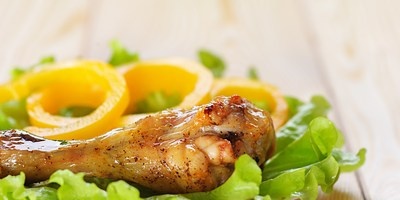|
 What is the difference between chicken and chicken? Is it possible to determine the quality of chicken by meat? What is the best way to store a bird? What is the best way to cook from one part or another? Here you will find all the answers to your questions about chicken, chicken and turkey. What is the difference between chicken and chicken? Is it possible to determine the quality of chicken by meat? What is the best way to store a bird? What is the best way to cook from one part or another? Here you will find all the answers to your questions about chicken, chicken and turkey.
Chicken or chicken - minor difference
Why is it usually fried chicken, not chicken, and why chicken, not chicken, is boiled broth? All differences lie in the duration of poultry feeding and in the characteristics of its meat. Chicken feeding time lasts 30 days. Therefore, the meat is especially tender and has a refined taste. The chicken, on the other hand, grows for over 15 months. The meat becomes slightly tougher and has a characteristic flavor. Grilling the chicken will make the meat too tough. And chicken will not be able to cook a thick and fatty broth.
Good quality chicken and turkey
Chicken and turkey meat is usually almost white in color, and we are so used to it that, when we see the darker meat in the store, we treat it with great distrust. However, good quality chicken and turkey are darker in color than we think. Thanks to rapid growth and keeping in houses without sunlight, chicks or turkeys gain weight very quickly. A turkey's breast is naturally larger than that of a chicken, and when intensively fed, it reaches incredible sizes. Therefore, such "fast" meat remains light. Chickens and turkeys raised in the poultry yard are, first of all, smaller and dark pink in color.
Chicken, turkey and chicken: hygiene comes first
 After purchase, poultry meat must be put in the refrigerator as soon as possible. The coldest place in the refrigerator is just above the vegetable drawer, and this is where you need to put the meat, no matter what. Meat should be kept separate from food eaten raw. Thus, food can be stored next to the meat, which needs to be warmed up at least a little before eating. After all, chicken, chicken and turkey can contain harmful microorganisms. This means that when slaughtered, bacteria such as Salmonella, Campyllus, Staphylococcus aureus and others can infect the meat. In general, the hygiene requirements for meat factories are very high, and there should be no certain harmful microorganisms in the meat, but infection can still occur, and therefore the following five rules must be observed when storing and preparing meat: After purchase, poultry meat must be put in the refrigerator as soon as possible. The coldest place in the refrigerator is just above the vegetable drawer, and this is where you need to put the meat, no matter what. Meat should be kept separate from food eaten raw. Thus, food can be stored next to the meat, which needs to be warmed up at least a little before eating. After all, chicken, chicken and turkey can contain harmful microorganisms. This means that when slaughtered, bacteria such as Salmonella, Campyllus, Staphylococcus aureus and others can infect the meat. In general, the hygiene requirements for meat factories are very high, and there should be no certain harmful microorganisms in the meat, but infection can still occur, and therefore the following five rules must be observed when storing and preparing meat:
1. After purchasing poultry, put it in the refrigerator as soon as possible to resume chilling.
2. Raw meat must be stored separately from foods that are eaten without processing, preferably on a shelf above the vegetable drawer, where the temperature is lowest.
3. After cooking raw meat, hands should be thoroughly washed with warm water and soap, and the same should be done with knives, cutting boards and poultry scissors.
4. Never use the same utensils after cooking meat, especially when it comes to raw foods such as salads, vegetables and fruits.
5. Meat should be cooked well to avoid contamination even in case of infection. Never eat raw or semi-cooked meat.
Which chicken tastes better: breast or legs?
Everyone answers this question in their own way. Someone loves crispy chicken legs, and someone loves tender breast. But any meat is cooked on the bone, that is, the chicken is fried whole, and not in parts like chicken fillet, because this makes the meat more aromatic. Of course, roasting a whole chicken will take a lot longer, but if you remove the back, the spine, it will be much faster.You just need to cut the chicken along the sides of the ridge with sharp poultry scissors. Then you can put the carcass flat and breast up on a baking sheet or grill. Alternatively, you can marinate your meat with herbs, spices, and other ingredients to give it a delicious flavor and aroma.
E.A. Mironova
|